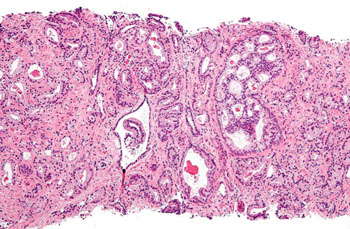New Test Could Accurately Predict Prostate Cancer Recurrence
By LabMedica International staff writers
Posted on 24 Apr 2014
A test based on genetic signature and tumor oxygen levels, which boost the test’s accuracy, can predict whether a man is at high risk of prostate cancer recurrence.Posted on 24 Apr 2014
Prostate cancer is the most common form of cancer in American men and approximately 233,000 new cases of prostate cancer will be diagnosed in the USA in 2014 and about 60% diagnoses are among men aged 65 and older. If the cancer has spread outside the prostate, the malignancy often goes undetected and this means the cancer will return in 30% to 50% of patients.

Image: Micrograph showing prostatic acinar adenocarcinoma, the most common form of prostate cancer (Photo courtesy of Zephron).
Scientists at the Princess Margaret Cancer Center (Toronto, ON, Canada) analyzed the prostate cancer tissue of 126 men who had undergone image-guided radiotherapy (IGRT), a treatment that focuses solely on the tumor in the prostate area. All men were predicted to have an intermediate risk of their cancer returning and were followed for an average of 7.8 years.
To investigate DNA in the men's tissue samples, the investigators used array comparative genomic hybridization (aCGH). This is a process that assesses a patient's whole genome and spots regions where there are sections of missing, additional or abnormal DNA. Through information gained using this technique, the team created a genetic signature that was able to accurately identify men who were at high or low risk of prostate cancer recurrence.
The scientists then tested this genetic signature on another group of 150 men who had their prostate cancer tumors removed via radical prostatectomy. These patients were also deemed as being at intermediate risk of cancer recurrence. They found that using the genetic signature, they were able to accurately predict which men were at high or low risk of their prostate cancer returning, just as they were in the first group.
The team tested the oxygen content (hypoxia) of tumors from men who had undergone IGRT. They found that the oxygen content of tumors alone was also able to predict the risk of patients' cancer recurrence. However, when they combined the genetic signature with information about the tumor's oxygen content, they developed a test that can predict a man's risk of prostate cancer with close to 80% accuracy. Men with low levels of genetic changes and low oxygen content in their tumors were less to likely to experience recurrence of prostate cancer, with 93% surviving for five years without it returning. Men who had high levels of genetic changes and high hypoxia were at higher risk of recurrence, with only 49% surviving for five years without prostate cancer returning.
Robert G Bristow, MD, FRCPC, PhD, a professor of oncology, said, “The team needs to validate the test over the next two to three years. But if all goes to plan, our findings could lead to a new test for cancer patients that will enable doctors to determine which patients require treatment that is not confined to the prostate region.” The study was presented at the 33rd conference of the European Society for Radiotherapy and Oncology (ESTRO33) held April 4-8, 2014 in Vienna (Austria).
Related Links:
Princess Margaret Cancer Center














